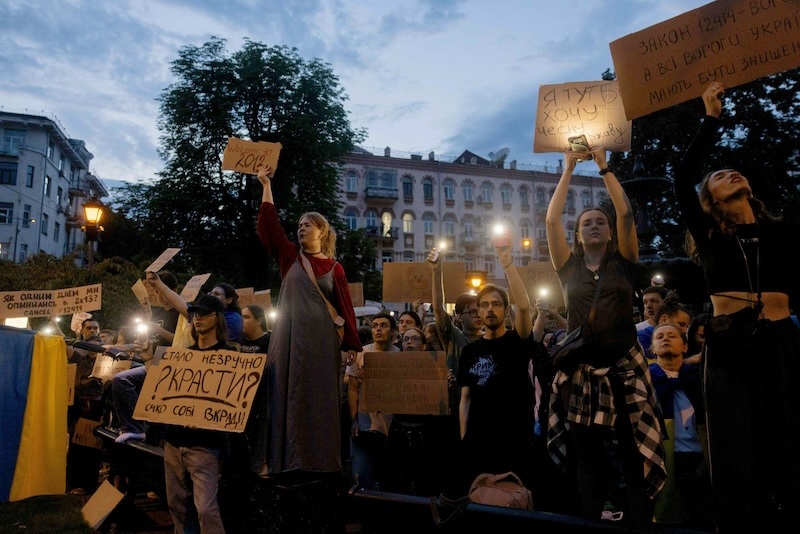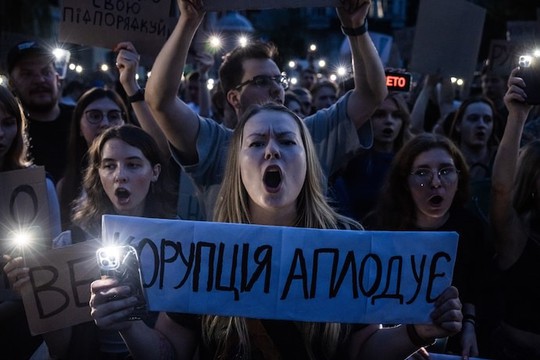A woman holds a sign saying “Corruption Applauds” during a protest against a new law targeting Ukraine’s anti-corruption bodies, on a road leading to Ukraine's presidential office, in Kyiv on July 22.
Photo: ‘The Washington Post’
Mass protests erupted in Kyiv and other Ukrainian cities late Tuesday after the country’s parliament passed legislation many fear will neutralize the country’s main anti-corruption bodies and roll back reforms introduced after a pro-Western revolution more than 10 years ago, ‘The Washington Post’ reports.
The government move against the anti-corruption bodies has alarmed former officials, concerned Ukraine’s European allies and thrown back into the spotlight an issue long used by the country’s detractors to criticize it. It could also affect Ukraine’s application to join the European Union.
More than 2,000 people gathered on a central Kyiv square close to the seat of President Volodymyr Zelensky’s administration, shouting “Shame!” in what is turning into the largest political controversy since Russia invaded Ukraine three years ago. Smaller protests broke out in Lviv, Dnipro and Odesa, and more protests are planned for Wednesday.
The law, which was passed by parliament deputies and signed quickly by Zelensky on Tuesday, places Ukraine’s National Anti-Corruption Bureau (NABU) and Specialized Anti-Corruption Prosecutor’s Office (SAPO) under the control of the general prosecutor’s office. Critics say that this will effectively abolish the two bodies’ independence.
The two institutions, which have previously functioned free of outside control, are the main anti-corruption bodies created since Ukraine’s 2014 Maidan Revolution.
In his regular evening address posted on social media, Zelensky framed the law as an effort to strengthen the work of the two bodies.
On Monday, agents from Ukraine’s security service, or SBU, general prosecutor’s office and State Bureau of Investigation raided NABU offices, claiming the existence of a “Russian ‘mole’ in one of the bureau’s elite units,” SBU head Vasyl Maliuk said.
Many Ukrainians flatly rejected the government’s explanations for the legislation, however. The move against the agencies also comes just a month after NABU opened a criminal case against then-Deputy Prime Minister Oleksiy Chernyshov, on charges of “abuse of office and receiving undue benefits in substantial amounts for himself and third parties,” it said in a statement at the time.
It was one of the highest-level corruption cases since Zelensky became president six years ago, targeting one of the closest allies of his powerful chief of staff, Andriy Yermak. Chernyshov denied the charges, but he lost his position in last week’s government reshuffle.
Kyiv Mayor Vitali Klitschko posted on social media that those responsible for the new law were “dragging Ukraine faster into authoritarianism.”
“It seems the authors and executors … have come to believe in the impunity of their arbitrariness,” wrote Klitschko, who appeared at the protest with his brother Volodymyr. “Hiding behind the war, [they are] destroying anti-corruption bodies, local self-government, silencing activists and journalists.”
Former Ukrainian foreign minister Dmytro Kuleba, who served under Zelensky for four years, wrote on Facebook that Tuesday was “a bad day for Ukraine.”
European officials immediately expressed their concern. Ukraine is involved in a years-long, arduous process of joining the E.U., in which anti-corruption efforts play a major role.
“The dismantling of key safeguards protecting NABU’s independence is a serious step back,” Marta Kos, E.U. commissioner for enlargement in charge of the process of countries applying to join the bloc, wrote on X.
In private conversations, European diplomats were even more alarmed. “Very worried” were the only words one said, on the condition of anonymity because of the sensitivity of the issue.
“Actions like these certainly undermine trust between Kyiv and Western allies,” another diplomat said, saying it could threaten Ukraine’s chances of joining the E.U. and “might even lessen the appetite to increase the military assistance to Ukraine.”

Kyiv, July 22
Photo: Reuters
Zelensky signed a law gutting the country’s anticorruption agency, despite protests urging him not to do so and criticism that it would silence dissent and concentrate power. The law was raced through parliament on Tuesday in a series of amendments to an unrelated bill.
Opposition-party officials complained that it hadn’t been passed according to the proper procedures, and tried unsuccessfully to block the podium during the vote. After it passed, Ukrainians across the country began gathering on the streets and denouncing the measure on social media in an effort to convince Zelensky not to sign, ‘The Wall Street Journal’ writes.
Kaleniuk, co-founder of the nongovernmental Anticorruption Action Center, who helped establish NABU after the 2014 revolution toppled a pro-Russian leader. She added that in recent months the U.S. seems to have dropped its emphasis on anticorruption efforts in Ukraine, which has freed the government’s hand to defang NABU.
The attack on anticorruption institutions risks undermining Western support for Ukraine, which has been essential in its fight against the Russian invasion and its goal of one day joining the European Union. Ambassadors from the Group of Seven countries in Kyiv said after meeting with officials from the anticorruption office on Tuesday that they “have serious concerns and intend to discuss these developments with government leaders.”
NABU was set up at the behest of Western allies preparing to lend billions to prop up Ukraine’s new government in 2014, who wanted to know the funds wouldn’t end up in officials’ pockets. The agency was launched in 2015 with technical support from the Federal Bureau of Investigation. It soon made waves, detaining high-profile targets.
…Zelensky decided to take this step because these organizations had collected materials about the corruption of his inner circle.
read more in our Telegram-channel https://t.me/The_International_Affairs

 14:35 23.07.2025 •
14:35 23.07.2025 •























